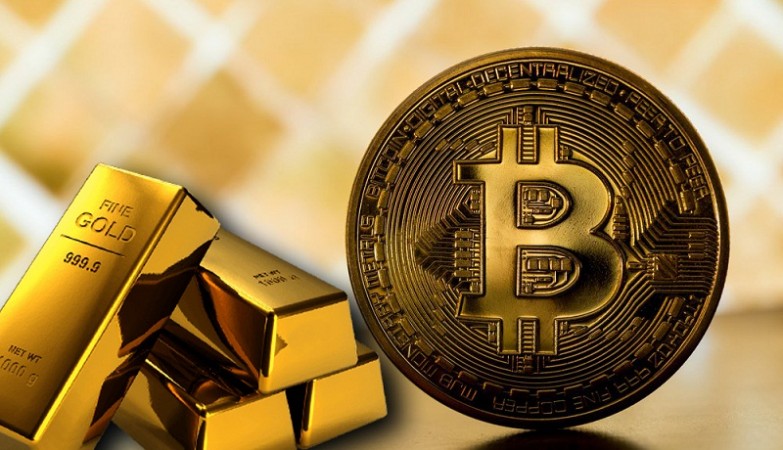
Bitcoin, once a novel concept in the world of finance, now stands at a pivotal crossroads. As its global presence grows, many grapple with a significant question: Is Bitcoin our future currency or merely the new gold? If you're looking for a top-tier platform to trade your crypto assets, consider using Immediate Peak
Bitcoin as the Future Currency
Bitcoin's potential as the currency of the future has been a hot topic of discussion since its inception. At its core, Bitcoin presents several advantages over traditional fiat currencies. One of the most significant benefits is its ability to facilitate global transactions without the need for intermediaries.
Furthermore, Bitcoin provides a safeguard against the devaluation often seen with fiat currencies. As many countries grapple with inflation and monetary policies that reduce the purchasing power of their national currencies, Bitcoin, with its capped supply of 21 million, offers a level of protection against inflationary pressures. This limited supply mimics the scarcity of precious resources, ensuring that Bitcoin's value isn't diluted over time by an endless printing of new coins.
However, with these benefits also come challenges. Bitcoin's price is notoriously volatile. While this can be an advantage for traders and investors looking for short-term gains, it poses problems for those wishing to use it as a stable medium of exchange. After all, nobody wants their purchasing power to halve overnight because of market fluctuations.
Regulatory concerns are another hurdle for Bitcoin's adoption as a mainstream currency. Governments around the world are still figuring out how to approach and regulate digital currencies, and this uncertainty can hinder businesses and consumers from embracing Bitcoin fully.
Bitcoin as the New Gold: A Store of Value
The comparison between Bitcoin and gold has been an enduring one in financial discourse. Both assets share intrinsic qualities that position them as valuable reservoirs in the economic landscape, and in many respects, Bitcoin is emerging as a modern counterpart to the age-old allure of gold.
Gold has been revered for centuries for its scarcity and universal acceptance as a store of value. Similarly, Bitcoin's capped supply, pegged at 21 million coins, ensures its scarcity in the digital realm. This scarcity is pivotal in preserving and potentially increasing Bitcoin's value over time, much like the limited supply of gold impacts its valuation.
Another crucial parallel between the two is their portability and durability. Gold, though tangible, can be transported, albeit with some logistical challenges. Bitcoin, being digital, takes this a step further, allowing for seamless transfers across the globe, without the weight or risk of physical transportation.
Historically, gold has proven its mettle by holding its value through economic downturns and political upheavals. Bitcoin's resilience in this arena is still under scrutiny. While it has shown impressive appreciation over the years, its response to global financial crises is still a topic of ongoing analysis. The digital currency has, however, demonstrated a level of detachment from traditional market movements, hinting at its potential as a reliable hedge against economic downturns.
The Role of Media and Speculation
The trajectory of Bitcoin's reputation and value has been significantly influenced by media coverage and market speculation. Media plays a monumental role in shaping perceptions, especially for something as novel and intricate as Bitcoin. When major news outlets spotlight Bitcoin, whether in a positive or negative light, it can cause rapid and notable fluctuations in its market value.
For instance, positive coverage from reputable financial sources or endorsements from prominent business figures can spur a rush of new investments, driving up the price. Conversely, negative press, especially concerning regulatory clampdowns or high-profile digital heists, can stoke fears and lead to sell-offs. In such a scenario, Bitcoin’s price becomes as much about belief in its future potential as it does its current utility.
Speculation, intertwined with media's influence, has been both a boon and a bane for Bitcoin. On one hand, speculative investments, driven by a fear of missing out, have led to rapid inflations in Bitcoin's value. This attracts even more attention and investment, creating a feedback loop of increasing demand and valuation. However, this very speculation-driven growth can also lead to instability. As speculative investors chase quick profits, they might sell off just as quickly as they bought in, leading to volatile price swings.
It's also worth noting that speculative bubbles, if unchecked, can lead to inflated values that don't reflect an asset's intrinsic worth. If such a bubble were to burst, it could result in a sharp decline in Bitcoin's value and shake the confidence of long-term investors.
Conclusion
As Bitcoin continues to evolve, its dual role as both a currency and a store of value becomes ever more pronounced. Only time will truly tell its destined path in the financial landscape.